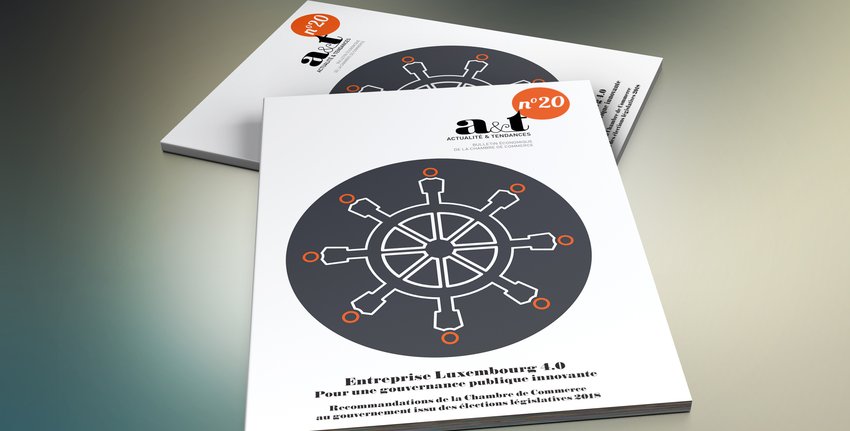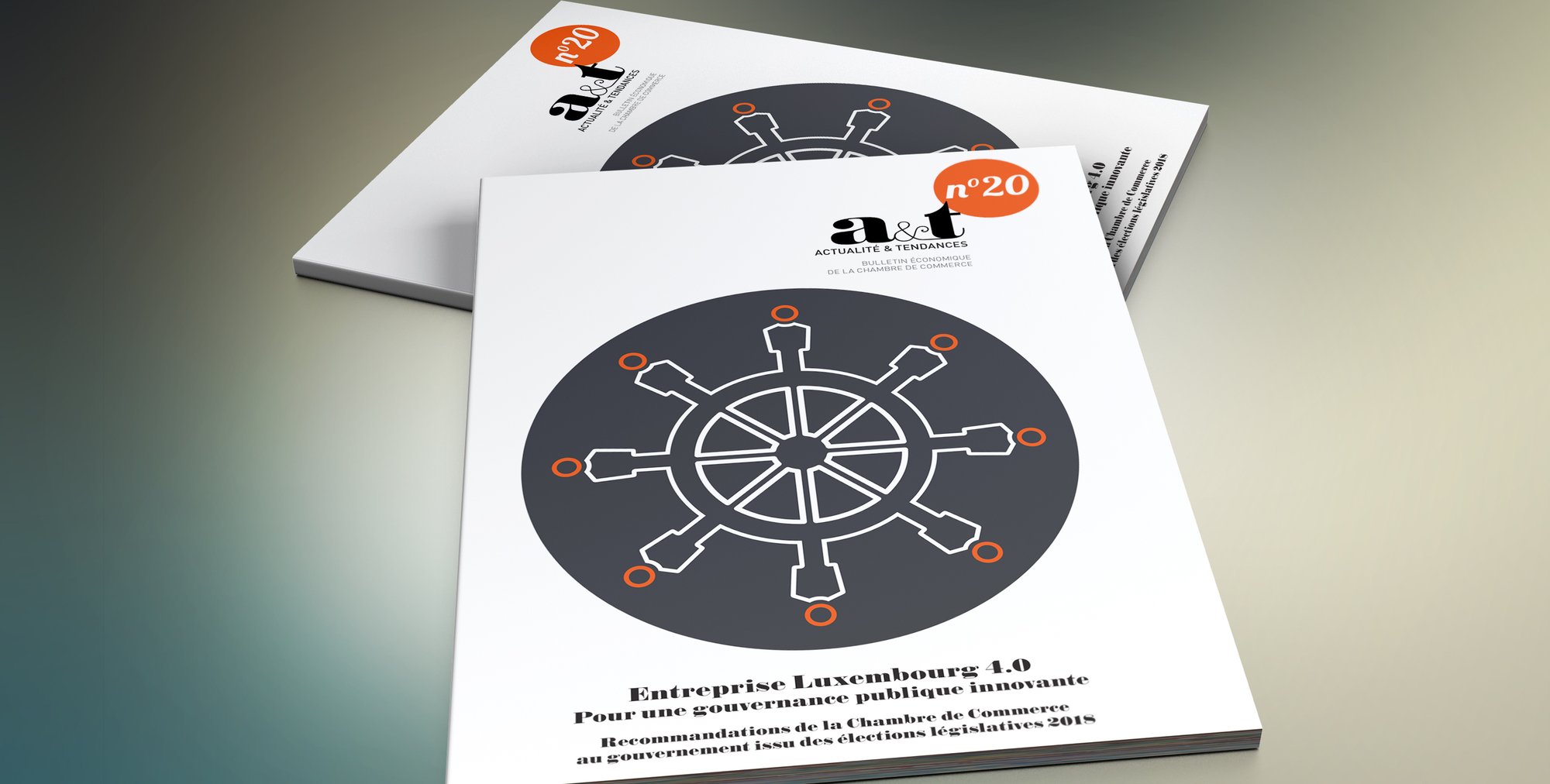
Actualité et tendances n°20

The Chamber of Commerce's Recommendations to the Government following the 14th October parliamentary elections.
Luxembourg, businesses and the State face a need to make a double transition: ecological and digital. Success would move the country towards a new "quality growth" model. Only by orienting towards the goal of a sustainable and interconnected economy will Luxembourg be able to succeed, maintaining a high quality of life and social cohesion for future generations. Central to this will be focusing on productivity gains and the efficient use of resources.
The latest edition of the Chamber of Commerce's "Actualité et tendances" publication is a user's guide to achieving these goals. It recognises that entrepreneurship and small and medium sized enterprises (SME) are central to strong, sustainable, and inclusive societies. The publication highlights the importance of the public sector as a player which can facilitate (or indeed slow down) this necessary double transition.
The Chamber of Commerce has highlighted four key measures which would provide the foundations for this model. These steps are prerequisites, and without them, further action would lack effectiveness.
- It is essential to prevent the return of inflation. Rising prices make economic activity more expensive and less competitive without increasing efficiency. Thus we need a freezing of prices for services (which tend to rise significantly more quickly than general inflation) set directly or indirectly by the state (so called "prix administrés"). This measure would also be an incentive for public sector efficiency gains.
- Many sectors rely on international demand rather than domestic demand. This is why an automatic salary indexation (even if applied infrequently) can be harmful if it is not accompanied by productivity gains. We should consider the complete de-indexation of the economy, or at least look at limiting the application of automatic increases. For example, indexation could be limited to a maximum of every 18 months.
- The way we organise our working lives is obsolete, and current flexibility only benefits employees. We must organise ourselves in line with the current realities of our digital world, moving away from the tight structures that stifle our SMEs.
- Successful ecological transition will only be achieved though more efficient use of resources, the promotion of the circular economy, and sustainable mobility. The durability of our socio-economic model depends on this.
As well, the Chamber of Commerce has highlighted six broad roles that the State 4.0 must tackle if we are to achieve growth 4.0:
- An entrepreneurial state places SMEs at the center of its strategy. This would involve drawing up an ambitious fifth national plan to help them, featuring a complete reworking of the current legal framework. Removing the "dead wood" of these rules would deliver a step-change towards the much-desired goal of administrative simplification. Ideally there would be procedures based on notification rather than authorisation. In addition, R&D would be further encouraged, with SMEs receiving added assistance to facilitate access to new ideas and techniques. It also leads a clear industrial policy.
- A sustainable state ensures secure energy supply at competitive prices, encourages energy efficiency, promotes use of economically viable renewable energies, and supports EU-level initiatives towards an Energy Union. It also creates a centralised one-stop-shop "front office" for all administrative processes related to planning (the environment, water, building permits etc).
- An open state promotes openness and defends our fundamental European freedoms. It supports and promotes external trade based on the principles of multilateralism, forging long-lasting connections which help Luxembourg reach new growth markets. It continues to work on the nation-branding strategy, encourages cooperation between public actors working towards internationalisation, and equips the country with modern MICE (meeting, incentives, conferences, and exhibition) infrastructure.
- A socially-aware state addresses the challenge of providing sufficient housing with integrated policies, in contrast to a system which limits rather than expands supply. It would re-establish intergenerational fairness, adapting the pensions and old-age care systems to future challenges. This would also feature a commitment to not increase the minimum wage (paid by businesses), since this would reduce the amount of income that could be shared, but not the number of people who are excluded from the economic system. It would not make it harder for SMEs to organise themselves by imposing unilateral arrangements related to parental leave, unless this was allied to opportunities to increase flexible working options. There would also be no move towards a general reduction in working time. Nevertheless, improvements to public transport, increased working times flexibility, and further encouraging teleworking possibilities, would give employees more leisure time without reducing working hours. The socially-aware state would reduce the dual nature of the employment market, with its current split between the public and private sectors. There would also be moves to give greater value to work by dismantling "inactivity traps", and there would be support for dialogue between social partners, both at the sectoral level and within enterprises. A socially-aware state with a strong economy leads an objective debate about poverty. It would take effective action to reduce housing costs for people on modest incomes, and would look to benefits-in-kind that serve to cut the rate of poverty substantially. Emphasis is put on facilitating a high-quality dialogue between the social partners within businesses. The aim is to develop targeted measures across society to boost each individual's opportunities to reach their potential. In addition to this socially oriented policy and dialogue, a modern state's responsibilities extend to providing a high performing educational system, and giving people access to quality housing at an acceptable price.
- A state committed to skills works with professional organisations at every level to support their training efforts. It also ensures that schools help to inspire entrepreneurial values. The goal is a national framework in which knowledge and skills are acquired, something that will also make Luxembourg more attractive for talented people from abroad. The skills-state works to reduce the waste of talent inherent in school failure and to this end creates monolingual streams at school.
- A managerial state conducts wide-ranging audits of public policy in order to increase expenditure efficiency. It also sets the example by driving forward the digitalisation of public services ("State 4.0"). A reinforced role for the sovereign wealth fund would give Luxembourg a route map to establish and sustain fiscal competitiveness. An integrated transport strategy would promote general improvements to the county's infrastructure.
The guiding principles of this plan for quality growth are coherence, dialogue and cooperation. Organisation into silos, fragmentation of responsibilities, contradictions, and lack of efficiency at the state level will harm efforts towards digital and environmental transformation. Improvements can be made, particularly by focusing state action onto its key roles, with a reduced number of coordinating super-ministries. This would consolidate the number of interlocutors for citizens, businesses and investors, creating a public "front office". The focus would be on administrative procedures that notify rather than authorise. Complex challenges require coherent solutions and integrated policies.
- Control inflation: Freeze prices of services set directly or indirectly by the state. No increase in subscriptions to social services. Modulation of salary indexation over the whole length of the legislature, and control salary costs in the state and semi-state sectors.
- Reform working practices: Suggest ambitious reforms of the way work is organised, particularly with the introduction of more flexibility. This is linked to the digitalisation of the workplace and the desire to empower businesses and economic sectors. Facilitate work and dismantle inactivity traps.
- Create a plan for SMEs: Put SMEs and administrative simplification at the centre of the economy. Draw up a 5th national action plan in favour of SMEs, with the support of the High Committee for the support of SMEs and entrepreneurship.
- National strategies to face national challenges: Define and put in place national governance measures regarding housing, and define a coherent strategy for public R&D. Link objectives for economic diversification with active support and funding for actions promoting skills at every level.
- Define an industry and diversification policy: Engage in a dialogue to define an ambitious policy, following the organisation of a "diversification forum".
- Creation of a public " Front Office ": Begin to centralise all public sector administrative tasks in a single "Front Office". Create a single public interlocutor for citizens, businesses and investors. Define a strategy based on notifications rather than one using authorisations.
- Rethink the pension system: Suggest a law reform in order to enable the reestablishment of a pension system that is both sustainable and features intergenerational fairness.
- One main teaching language: Run a pilot project with two parallel linguistic streams in the 2019/20 school year.
- Openness: Consolidate and develop Luxembourg's international orientation and openness. Put in place an ambitious promotion policy supported by modern infrastructure, policies promoting integration, and attracting people to the country. Have a linguistic regime that suits socio-economic reality.
- Re-establish fiscal competitiveness: Define an ambitious fiscal road map that assists established businesses, talented individuals, researchers, startups, and the generation of intellectual property.
Together these measures must be led by a State 4.0 which is financially sustainable and is equipped with integrated governance structures. This includes digitalised procedures and public services, a refocusing of state activity around the main governmental tasks with a limited number of centralised "super-ministries". The prime minister should have the right to issue directives, there needs to be more transversal cooperation, wider access to public sector employment, a policy of evaluating public policy, budgeting based on objectives and performance, etc.



